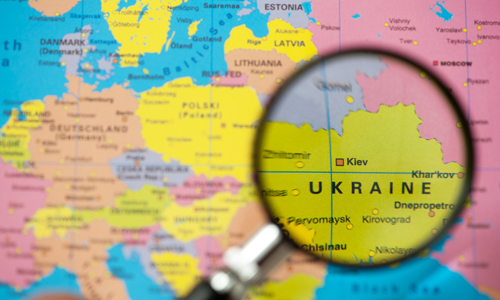Last Monday it appeared the United States was marching toward possible military action against Syria. Fast forward just four days, and top diplomats from the United States and Russia are in Geneva trying to hammer out an agreement about how to secure Syria’s chemical weapons – the success of which will shape broader talks on the Syrian peace process, wrote WOUB’s Atish Baidya on Friday, Sept. 13. She interviewed interviewed Dr. Steven Miner, Professor of History and Director of the Contemporary History Institute.
Russia has played a pivotal role in getting the Syrian regime to agree to give up its chemical weapons.
Ohio University History Professor Steve Miner says Russian President Vladimir Putin would like to restore Russia’s stature in the world.
“Certainly Putin sees the United States as a rival and feels the United States benefited from the collapse of the Soviet Union,” Miner said. “He called it the greatest geopolitical catastrophe of the 20th century.”
Miner says Putin’s actions so far on Syria reflect the trend of his foreign policy.
“[He] sees that it’s [American foreign policy] in retreat and figures this is a way to throw a spoke into American plans,” Miner said.
Miner said Russia’s interest in the region is part of a long-term geopolitical power contest.
“I think in terms of geo-strategy it doesn’t want to see the United States dominate its southern flank,” he said. “This is part of a larger, greater power contest. It doesn’t mean that it’s about to erupt into war or you can’t engage in all kinds of fruitful cooperation with the Russians, but it does mean that they do not want to see American interests dominant in their backyard.”
Miner studied at Kings College, London, Rice University, and Indiana University. He is a specialist in recent Russian/Soviet and East European history. His first book, Between Churchill and Stalin: The Soviet Union, Great Britain, and the Origins of the Grand Alliance (1988), won the American Historical Association’s 1991 George Louis Beer prize for the best book of the year in European history. His latest book is Stalin’s ‘Holy War’: Religion, Nationalism, and Alliance Politics, 1941-1945 (2003). He is currently at work on a history of the Soviet Union during the Second World War, tentatively titled The Furies Unleashed: The Soviet People at War, 1941-1945, to be published in the United States by HarperCollins and in Great Britain by Bloomsbury. He is also the author of numerous articles, book chapters, and review essays.



















Comments